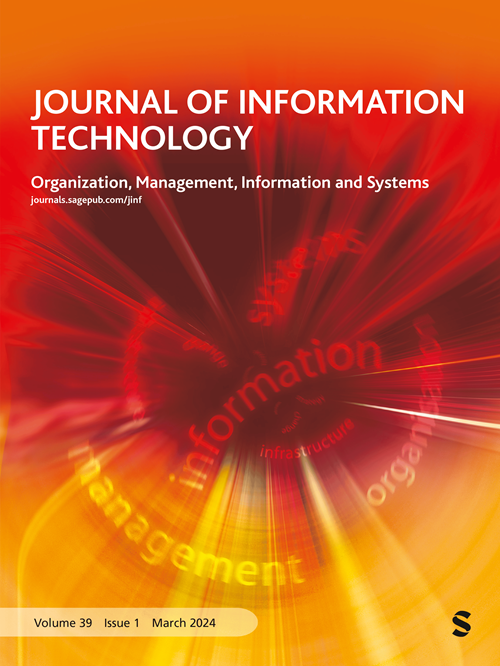Proactive Digital Workplace Transformation: Unpacking Identity Change Mechanisms in Remote-First Organisations
IF 5.4
3区 管理学
Q1 COMPUTER SCIENCE, INFORMATION SYSTEMS
引用次数: 0
Abstract
Digital transformation fundamentally changes the way individuals conduct work in organisations. In accordance with this statement, prevalent literature understands digital workplace transformation as a second-order effect of implementing new information technology to increase organisational effectiveness or reach other strategic goals. This paper, in contrast, provides empirical evidence from two remote-first organisations that undergo a proactive rather than reactive digital workplace transformation. The analysis of these cases suggests that new ways of working can be the consequence of an identity change that is a precondition for introducing new information technology rather than its outcome. The resulting process model contributes a competing argument to the existing debate in digital transformation literature. Instead of issuing digital workplace transformation as a deliverable of technological progress and strategic goals, this paper supports a notion of digital workplace transformation that serves a desired identity based on work preferences.积极主动的数字工作场所转型:解读远程优先组织中的身份转变机制
数字化转型从根本上改变了个人在组织中开展工作的方式。根据这一说法,流行的文献将数字化工作场所转型理解为实施新信息技术以提高组织效率或实现其他战略目标的二阶效应。与此相反,本文提供了两个远程优先组织的经验证据,这些组织经历了主动而非被动的数字化工作场所转型。对这些案例的分析表明,新的工作方式可能是身份转变的结果,而身份转变是引入新信息技术的前提,而不是结果。由此产生的流程模型为数字化转型文献中的现有争论提供了一个相互竞争的论据。本文并没有将数字工作场所转型作为技术进步和战略目标的一个可实现目标,而是支持一种数字工作场所转型的概念,即基于工作偏好的理想身份。
本文章由计算机程序翻译,如有差异,请以英文原文为准。
求助全文
约1分钟内获得全文
求助全文
来源期刊

Journal of Information Technology
工程技术-计算机:信息系统
CiteScore
10.00
自引率
1.80%
发文量
19
审稿时长
>12 weeks
期刊介绍:
The aim of the Journal of Information Technology (JIT) is to provide academically robust papers, research, critical reviews and opinions on the organisational, social and management issues associated with significant information-based technologies. It is designed to be read by academics, scholars, advanced students, reflective practitioners, and those seeking an update on current experience and future prospects in relation to contemporary information and communications technology themes.
JIT focuses on new research addressing technology and the management of IT, including strategy, change, infrastructure, human resources, sourcing, system development and implementation, communications, technology developments, technology futures, national policies and standards. It also publishes articles that advance our understanding and application of research approaches and methods.
 求助内容:
求助内容: 应助结果提醒方式:
应助结果提醒方式:


